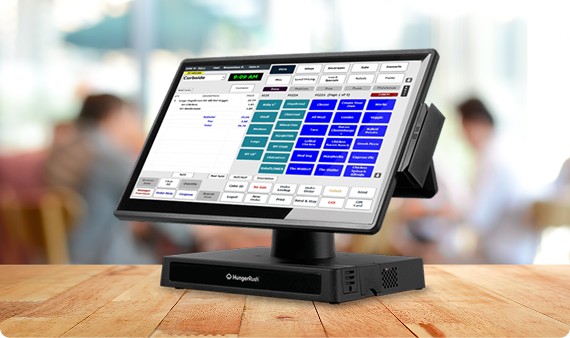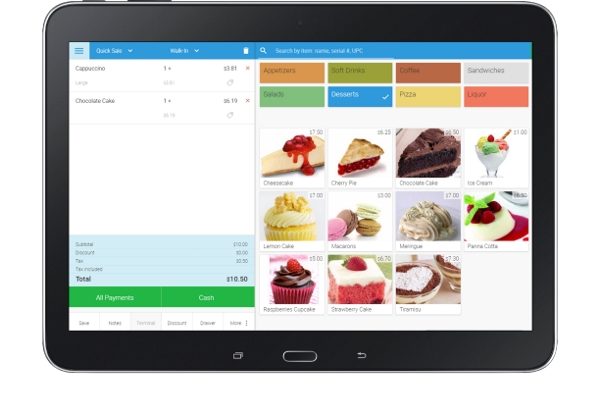Recognizing the Value of POS Software in Modern Retail Procedures
In today's retail landscape, the function of POS software has actually ended up being progressively substantial. These systems have actually transformed from fundamental sales register to multifaceted tools that boost various aspects of operations. They not just simplify purchases yet additionally provide understandings that can shape organization methods. Recognizing how these systems influence consumer experience and stock management is vital for any kind of merchant seeking to continue to be affordable. The effects of these improvements necessitate additional exploration.
The Evolution of POS Software: From Purchase Processing to Comprehensive Solutions

Enhancing Client Experience Via Advanced POS Features

Streamlining Supply Management With Integrated POS Systems
Integrated POS systems play an essential duty in enhancing inventory management by automating processes that traditionally needed considerable manual effort. These systems allow merchants to track inventory levels in actual time, removing inconsistencies that commonly arise from hand-operated supply counts. With attributes such as barcode scanning and automatic stock replenishment informs, services can preserve perfect supply levels without overstocking or stockouts.Furthermore, integrated POS systems facilitate exact projecting by assessing historic sales information, permitting retailers to make enlightened acquiring choices. This anticipating capacity assists companies adjust to altering consumer demands and seasonal trends extra effectively.Additionally, the centralization of supply information across numerous sales channels improves exposure, allowing merchants to handle their stock much more efficiently. Eventually, the integration of POS systems into inventory monitoring streamlines operations, minimizes human error, and adds to boosted productivity.
Real-Time Sales Tracking and Coverage for Informed Decision-Making

Exact inventory administration lays the groundwork for efficient sales monitoring and coverage. Real-time sales tracking allows merchants to monitor sales performance as it occurs, providing prompt insights right into client purchasing patterns and trends. This capability permits services to respond promptly to fluctuations sought after, enhancing stock degrees and decreasing overstock or stockouts.Moreover, incorporated POS systems assist in the generation of detailed reports, highlighting key metrics such as sales by category, time durations, and private products. Such reporting capacities empower retailers to make data-driven decisions, recognizing successful techniques and locations needing enhancement.
The Duty of POS Software in Customer Partnership Management
POS software plays a vital function in enhancing customer relationship monitoring by enabling merchants to carry out customized advertising methods. By evaluating customer information, organizations can customize promos and interactions to satisfy individual preferences. Furthermore, these systems help with the development of boosted commitment programs that encourage repeat service and strengthen customer involvement.
Personalized Advertising And Marketing Strategies
As sellers increasingly look for to enhance customer loyalty and engagement, customized advertising and marketing approaches have arised as an important component of effective customer partnership management. POS software plays an essential duty in this procedure by collecting and evaluating customer data, making it possible for stores to tailor advertising my website and marketing efforts to individual preferences and buying habits. By leveraging understandings from purchase histories, retailers can develop targeted promos and individualized communications that reverberate with clients, promoting a much deeper link. In addition, the integration of POS software with customer partnership management systems permits smooth tracking of consumer interactions, ensuring that advertising strategies remain pertinent and prompt (Restaurant POS Software). This data-driven technique not just improves customer contentment but also drives sales and encourages repeat service, strengthening the seller's market placement
Boosted Commitment Programs
Stores are increasingly recognizing the significance of loyalty programs in promoting long-lasting customer relationships and enhancing general engagement. POS software plays a necessary function in the advancement and management of these programs, permitting retailers to track client acquisitions, choices, and habits efficiently. By leveraging data analytics, organizations can develop tailored incentives and rewards that reverberate with specific customers, thus increasing participation in loyalty programs. In addition, POS systems allow seamless integration with mobile applications and digital systems, facilitating easy access to benefits and promotions. This not just boosts consumer satisfaction however likewise drives repeat organization. Eventually, POS software equips sellers to grow much deeper links with their customers, transforming occasional buyers into loyal clients with targeted and meaningful involvement methods.
Incorporating POS Systems With Shopping Platforms for Omnichannel Success
To accomplish real omnichannel success, seamless integration in between point-of-sale (POS) systems and e-commerce systems is crucial. This combination allows stores to unify their inventory management, guaranteeing that item schedule is precisely reflected across both online and physical stores. Clients profit from a cohesive buying experience, where they can easily switch in between networks without coming across discrepancies.Furthermore, integrated systems promote real-time information sharing, allowing services to analyze consumer behavior and choices a lot more efficiently. This data-driven approach allows stores to customize marketing methods and maximize stock levels, ultimately improving consumer fulfillment and driving sales.Additionally, the capacity to process transactions across platforms streamlines operations, lowering the threat of mistakes and boosting overall efficiency. As retailers progressively adopt omnichannel approaches, the combination of POS systems with ecommerce platforms continues to be an important variable in achieving sustainable growth and maintaining competitive benefit in the vibrant retail landscape.
Future Fads in POS Modern Technology and Their Effect On Retail Procedures
As retail operations evolve, future patterns in POS technology are set to improve the landscape significantly. The rise of cloud-based solutions, technologies in mobile POS systems, and the advantages of AI combination are among the essential advancements expected to enhance performance and client experience. These improvements promise to enhance processes and foster a more dynamic retail atmosphere.
Cloud-Based Solutions Rise
With the enhancing dependence on innovation, cloud-based POS solutions are changing retail operations by providing boosted adaptability and scalability. These systems enable stores to access real-time information from anywhere, facilitating much better decision-making and client service. By leveraging cloud infrastructure, organizations can decrease ahead of time expenses related to software and hardware installments while making certain smooth updates and upkeep. In addition, cloud-based options support multi-location monitoring, permitting merchants to synchronize stock and sales throughout different outlets easily. This adaptability is necessary in today's busy market, where consumer preferences shift swiftly. As even more merchants her latest blog take on these services, they can expect better operational performance and a much more responsive method to market needs, ultimately improving client fulfillment and loyalty.
Mobile POS Innovations
The development of retail innovation remains to shape procedures, specifically with the rise of mobile POS technologies. These systems allow stores to refine deals anywhere within the store, boosting client engagement and improving checkout processes. Mobile POS services boost supply monitoring by enabling immediate access to stock levels, aiding personnel help clients a lot more efficiently. On top of that, they help with tailored shopping experiences through integrated client information and commitment programs. As smart phones become increasingly innovative, stores are taking on functions such as contactless settlements and electronic receipts, in addition enhancing the purchasing trip. The change in the direction of mobile POS not only improves functional performance but additionally lines up with the expanding consumer choice for ease, making sure that stores stay affordable in a swiftly evolving market.
AI Integration Advantages
AI assimilation represents a transformative leap in POS modern technology, providing sellers a myriad of benefits that improve operational efficiency and consumer experience. Our site By leveraging device learning formulas, merchants can examine purchasing patterns and enhance inventory management, minimizing waste and stockouts. Furthermore, AI-powered analytics provide tailored marketing referrals, enabling targeted promos that enhance client engagement and commitment. Chatbots and online aides streamline client solution, enabling for quicker resolution of queries and improving the overall buying experience. Anticipating analytics can additionally anticipate need fads, making it possible for smarter staffing and resource allocation. Eventually, the assimilation of AI in POS systems empowers merchants to make data-driven decisions, fostering an one-upmanship in an ever-evolving retail landscape.
Regularly Asked Questions
What Are the Expenses Connected With Carrying Out POS Software?
The costs connected with implementing POS software can consist of software licensing fees, hardware costs, setup charges, training costs, and continuous maintenance. Each factor adds to the total financial investment needed for an effective application.
Just How Can Small Retailers Take Advantage Of POS Systems?
Little sellers can benefit from POS systems through boosted deal performance, streamlined stock administration, and improved customer understandings. These systems enable better decision-making, ultimately causing boosted sales and customer complete satisfaction in open markets.
What Equipment Is Required for a POS System?
A normal POS system requires necessary equipment parts, including a touchscreen display, cash money cabinet, barcode scanner, invoice printer, and payment terminal. These components function with each other to help with efficient purchase handling and stock administration for sellers.

Can POS Software Be Customized for Certain Retail Needs?
POS software can indeed be tailored to fulfill details retail requirements. Restaurant POS Software. This flexibility enables services to customize attributes, interfaces, and coverage devices, enhancing operational efficiency and offering a much more customized experience for both personnel and consumers
Exactly How Safe Is Client Information in POS Systems?
The protection of client data in POS systems varies widely. Several systems carry out file encryption, safe accessibility controls, and routine updates, yet susceptabilities can still exist, demanding recurring watchfulness and positive steps from stores to secure delicate information.